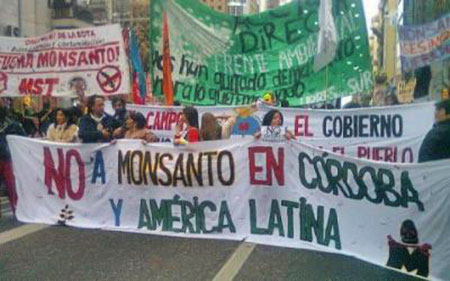|

January 10, 2014
from
MercoPress Website
A labor
appeals court in north-central Argentina
ruled that the
construction of a Monsanto plant
is unconstitutional,
halting work on the site.
The three judge
court ruled 2-1 in favor of the activists
who filed a legal
appeal against Monsanto’s GMO seed plant
on environmental
protection grounds
in the municipality
of
Malvinas Argentinas,
located in central
Cordoba Province.

Activists had been
blockading the construction site for 113 days,
preventing workers
from completing work on the plant
"We have filed a criminal complaint to inform the prosecutor of
certain irregularities in violation of environmental law that
have occurred in the heart of the Ministry of the Environment
which is involved with authorizations of projects," said
attorney Raúl Montenegro.
The construction at the site has been
suspended until an environmental assessment is completed to
determine the plant’s future impact on the area. Local newspaper La
Voz reported that the environmental study could be completed as soon
as early February.
The multinational company said it will appeal the decision.
"We consider our right to build
legitimate since we have complied with all legal requirements
and have obtained authorization to build according to the
regulations," said Monsanto’s statement.
The company stated that it already
conducted an environmental assessment, which is currently under the
review by the provincial Secretary of the Environment.
Activists had been blockading the construction site for 113 days,
preventing workers from completing work on the plant.
Monsanto countered in a statement that,
"for over three months Monsanto
employees and contractors had not been able to exercise their
right to work, due to the action of extremists who blocked the
site, incited violence and systematically ignored judicial
decisions."
In October a new report revealed that
pesticides sold by Monsanto are linked to health problems ranging
from birth defects to elevated rates of cancer in Argentina.
A lack of regulations has led to
widespread misuse of Monsanto’s products in agriculture rich
Argentina.
Media investigations pointed to a clear link between the use of
pesticides
sold by Monsanto and worsening
health problems in Argentina. The reports documented a number of
occasions when toxic pesticides were used close to populated areas
and consequently contaminated the water supply and caused health
problems.
The multinational company is facing global criticism elsewhere as
well.
In October thousands took to streets
across the world’s cities to protest the use of GMO products, with
Monsanto a common target. Over 50 countries have been taking part in
the march for
world food day, and across 47
different US states.
The demonstrators have been calling for the permanent boycott of
Genetically Modified Organisms (GMOs)
and "other harmful agro-chemicals," according to March Against
Monsanto’s official webpage.
A previous
anti-Monsanto protest was held in
May. It started as a small event, but turned into a global campaign
with over 2 million people in 436 cities, across 52 countries,
joining the rallies.
Nevertheless Monsanto saw its shares surge by more than 2% on
Wednesday morning after announcing better-than-expected first
quarter earnings earlier that day. The company said that for the
quarter ending November 30, 2013 it earned 368 million, or 69 cents
per share.
One year earlier, the company earned
only 339 million during that period, the Associated Press reported.
|

